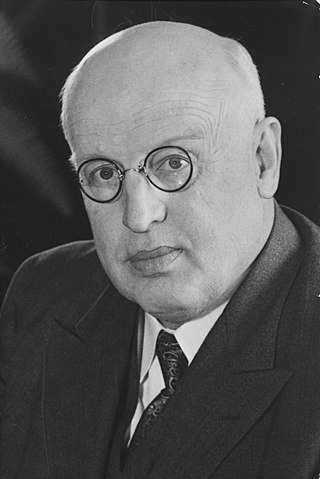
William Aberhart, also known as "Bible Bill" for his radio sermons about the Bible, was a Canadian politician and the seventh premier of Alberta from 1935 to his death in 1943. He was the founder and first leader of the Alberta Social Credit Party, which believed the Great Depression was caused by ordinary people not having enough to spend. Therefore, Aberhart argued that the government should give each Albertan $25 per month to spend to stimulate the economy, by providing needed purchasing power to allow needy customers to buy from waiting businesses.
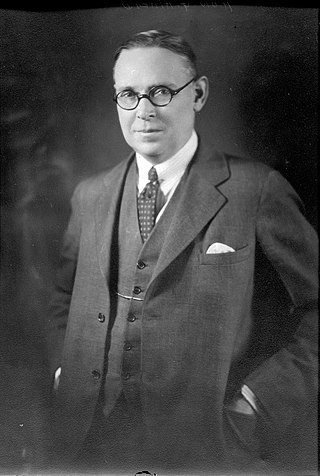
Richard Gavin "Dick" Reid was a Canadian politician who served as the sixth premier of Alberta from 1934 to 1935. He was the last member of the United Farmers of Alberta (UFA) to hold the office, and that party's defeat at the hands of the upstart Social Credit League in the 1935 election made him the shortest serving premier to that point in Alberta's history.
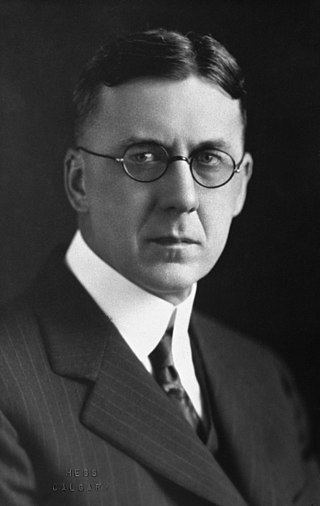
John Edward Brownlee, was the fifth premier of Alberta, serving from 1925 until 1934. Born in Port Ryerse, Ontario, he studied history and political science at the University of Toronto's Victoria College before moving west to Calgary to become a lawyer. His clients included the United Farmers of Alberta (UFA); through his connection with that lobby group, he was involved in founding the United Grain Growers (UGG).

Alberta Social Credit was a provincial political party in Alberta, Canada, that was founded on social credit monetary policy put forward by Clifford Hugh Douglas and on conservative Christian social values. The Canadian social credit movement was largely an out-growth of Alberta Social Credit. The Social Credit Party of Canada was strongest in Alberta, before developing a base in Quebec when Réal Caouette agreed to merge his Ralliement créditiste movement into the federal party. The British Columbia Social Credit Party formed the government for many years in neighbouring British Columbia, although this was effectively a coalition of centre-right forces in the province that had no interest in social credit monetary policies.

The United Farmers of Alberta (UFA) is an association of Alberta farmers that has served different roles in its 100-year history – as a lobby group, a successful political party, and as a farm-supply retail chain. As a political party, it formed the government of Alberta from 1921 to 1935.

The Alberta New Democratic Party, commonly shortened to Alberta's NDP, is a social-democratic political party in Alberta, Canada. It is the provincial Alberta affiliate of the federal New Democratic Party, and the successor to the Alberta section of the Co-operative Commonwealth Federation and the even earlier Alberta wing of the Canadian Labour Party and the United Farmers of Alberta. From the mid-1980s to 2004, the party abbreviated its name as the "New Democrats" (ND).

The 1921 Alberta general election was held on July 18, 1921, to elect members to the 5th Alberta Legislative Assembly. It was one of only five times that Alberta has changed governments.

The 1935 Alberta general election was held on August 22, 1935, to elect members of the Legislative Assembly of Alberta. The newly founded Social Credit Party of Alberta won a sweeping victory, unseating the 14-year government of the United Farmers of Alberta. It was one of only five times that Alberta has changed governments.

The 1940 Alberta general election was held on March 21, 1940, to elect members of the Legislative Assembly of Alberta.
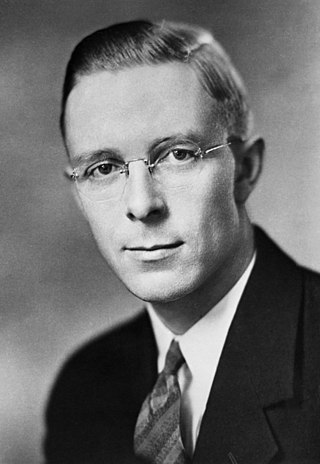
The 1944 Alberta general election was held on August 8, 1944 to elect members of the Legislative Assembly of Alberta.
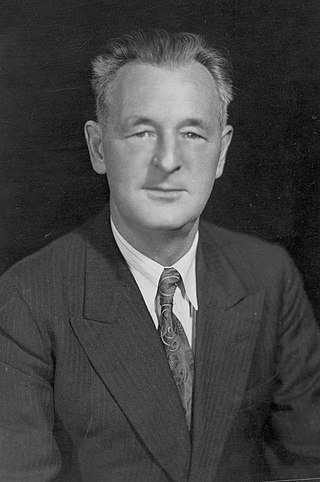
William Irvine was a Canadian politician, journalist, and clergyman. He served in the House of Commons of Canada on three occasions, as a representative of Labour, the United Farmers of Alberta, and the Co-operative Commonwealth Federation. During the 1920s, he was active in the Ginger Group of radical Members of Parliament (MPs).

The John Brownlee sex scandal occurred in 1934 in Alberta, Canada, and forced the resignation of the provincial Premier, John Edward Brownlee. Brownlee was accused of seducing Vivian MacMillan, a family friend and a secretary for Brownlee's attorney-general in 1930, when she was 18 years old, and continuing the affair for three years. MacMillan claimed that the married premier had told her that she must have sex with him for his own sake and that of his invalid wife. She had, she testified, relented after physical and emotional pressure. Brownlee called her story a fabrication, and suggested that it was the result of a conspiracy by MacMillan, her would-be fiancé, and several of Brownlee's political opponents in the Alberta Liberal Party.

The 8th Alberta Legislative Assembly was in session from February 6, 1936, to February 16, 1940, with the membership of the assembly determined by the results of the 1935 Alberta general election held on August 22, 1935. The Legislature officially resumed on February 6, 1936, and continued until the ninth session was prorogued and dissolved on February 16, 1940, prior to the 1940 Alberta general election.
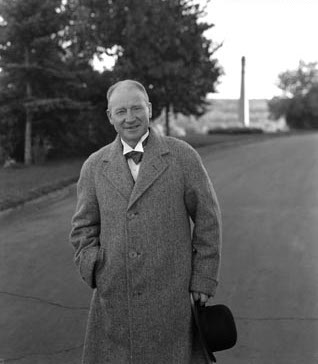
John William Hugill was a Canadian lawyer and politician who served as Attorney General of Alberta from 1935 until 1937. Born in England, he came to Canada and studied law before setting up a practice in Calgary. He became a prominent resident of that city, and served two years on its city council. In the early 1930s, he was one of the few prominent Calgarians with mainstream respectability to support William Aberhart's Social Credit League. He was elected as a candidate for it in the 1935 provincial election and, when it formed government, was named Attorney General by Aberhart.

John Edward Brownlee was Premier of Alberta, Canada, from 1925 to 1934 as leader of the United Farmers of Alberta (UFA) caucus in the Legislative Assembly of Alberta. After a number of early successes, his popularity and his government's suffered from the hardships of the Great Depression. In 1934, he was embroiled in a sex scandal when a family friend sued him for seduction. Though Brownlee denied the events she alleged, when the jury found in her favour he announced his resignation as premier.

John Farquhar Lymburn was a Canadian politician who served as Attorney-General of Alberta from 1926 until 1935. Born and educated in Scotland, he came to Canada in 1911 and practiced law in Edmonton. In 1925, John Edward Brownlee became Premier of Alberta, and sought a lawyer without partisan affiliation to succeed him as attorney-general. Lymburn accepted the position, and was elected to the Legislative Assembly of Alberta in the 1926 election. As attorney-general, Lymburn took part in negotiations between the Alberta and federal governments over natural resource rights, prepared Alberta's submission in the Persons case, and played a minor role in the sex scandal that forced Brownlee from office. In the 1935 provincial election, Lymburn and all other United Farmers of Alberta candidates were defeated, as William Aberhart led the Social Credit League to victory. Lymburn made an unsuccessful attempt to return to the legislature in 1942, and briefly returned to prominence during the Bankers' Toadies incident, before dying in 1969.

The 1937 Social Credit backbenchers' revolt took place from March to June 1937 in the Canadian province of Alberta. It was a rebellion against Premier William Aberhart by a group of backbench members of the Legislative Assembly (MLAs) from his Social Credit League. The dissidents were unhappy with Aberhart's failure to provide Albertans with CA$25 monthly dividends through social credit as he had promised before his 1935 election. When the government's 1937 budget made no move to implement the dividends, many MLAs revolted openly and threatened to defeat the government in a confidence vote.
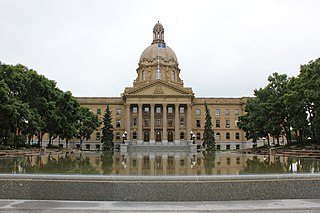
The Accurate News and Information Act was a statute passed by the Legislative Assembly of Alberta, Canada, in 1937, at the instigation of William Aberhart's Social Credit government. It would have required newspapers to print "clarifications" of stories that a committee of Social Credit legislators deemed inaccurate, and to reveal their sources on demand.

John Edward Brownlee served as Attorney-General of the province of Alberta in western Canada from 1921 until 1926, in the United Farmers of Alberta (UFA) government of Herbert Greenfield. As Brownlee was the only lawyer in a caucus formed almost entirely of farmers, his role extended beyond the traditional expectations of an attorney-general, and ranged from providing legal advice to explaining how to write a business letter; he also became the government's de facto leader in the Legislative Assembly of Alberta.















